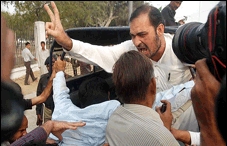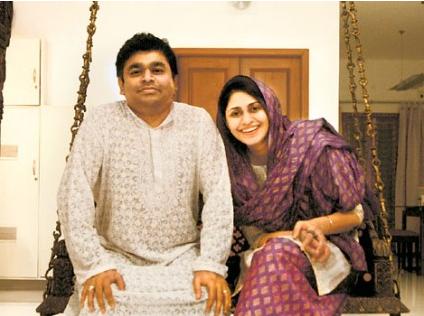By Azhar Aslam and Shaista Kazmi (Vision21)
Pakistan is in a classic ‘cry wolf’ situation. Now that the wolf has come one risks shouting about it at the peril of being called paranoid, liar, crazy or conspiracy theorist. But this unfortunate ‘wolf cry’ of the ‘foreign hand’ may have given a room to maneuver and protection to the external players and handlers. Fourteen ( or twelve) gunmen attacked Sri Lankan cricket team and their guards in a coordinated, well planned attack and got away (until now). But fool may be the one who thinks this was a senseless attack with the aim of terrorising ordinary Lahorites. So let us just look at the facts and let everyone draw their own conclusion. The attack has raised many questions which are pertinent and of utmost relevance and must be answered in a forensic manner.
Attackers: These observations are made on the basis of TV footage available.
Attackers were young (apparently 14 in number). They were heavily armed, had latest equipment for communication and had enormous firepower. They were wearing trousers and shirts and shalwar and shirts and traveled by rickshaws and car. They were not classic Taliban look-alike. They managed to transport all this heavy weaponry to Liberty. That must have required planning and human resource.
They must have had more accomplices who helped them escape. After they ran off there must have been transport waiting to ferry them away. So the routes and roads must have been well known. Some of the attackers were already positioned in the roundabout itself.
For escape there must have been at least seven rickshaws (unlikely), 3-4 cars or couple or mini vans or a mixture of these (to carry 14 people unless some of them walked to escape in the ensuing chaos). This means there were at least 3 to 8 other people involved. This brings a group total to about twenty.
Surely keeping a lid on this operation between twenty people must have been difficult. So it must have been very highly disciplined gang who has already committed such acts and whose members knew each other well. Or if for security these people were being told at the very last minute what to do, then that indicates a certain amount of professionalism that comes with lot of money and lot of previous training and expertise. So while attackers on Mumbai may have time on their side and planners could have chosen a complete novice and trained him at their leisure, this could not have been the case in Lahore attack, which could only involve pre-trained group of people, who in all likelihood have worked together before. Although possibility of two or three separate gangs being knitted together with specific tasks cannot be ruled out. We should expect this should make the tasks for investigators relatively easy. But where were the handlers?
Planning of the attacks: The planning for this attack must have started only after, when Srilanka decided to visit Pakistan. It may have been soon after, but not before. There must have been a decision made and approved, attackers chosen, trained, route analyzed, security arrangements analyzed for the weaknesses and some sort of simulation must have taken place. This again leads to the conclusion that these attacks and level of sophistication indicates previous expertise, not a new outfit, where equipment, training and manpower had to be present and in place before hand. The attackers (or at least those caught on the camera) clearly looked, ordinary regular guys. They must have been Punjabi speaking to make it easy to mingle in with the populace to get away.
The nature of the attack: The attack itself well coordinated, well planned, and systematically executed. The place of attack, a large well known junction in Lahore ( ironically called Liberty chowk) was clearly chosen to create maximum impact and to attract wide media attention. There was clear element of dramatization. Lahore is an iconic city called heart of Pakistan. The choice was calculated. Most importantly it was not suicide attack, and attackers successfully got away as they intended to. It is being claimed that food stuff they carried indicates that they may have wanted to kidnap the cricketers. That may be true. But it is unlikely that the purpose behind that would have been any other than creating more mayhem and chaos. The planners for the attack clearly knew that these attacks will be immediately seen in the background of Mumbai attacks and will have certain specific ramifications. The sophistication of the attack was like a commercial operation carried out in the field leveled by the ferocious insurgency by ‘Islamist’ militants. While the attackers may or may not have been Pakistanis, the puppeteers were definitely not.
Targets: The choice of Sri Lankan cricket team as target is most interesting. While the attack clearly has the international dimension that attackers wanted to have, it is not a classic jihadist anti-white, anti-western attack. Cricket as a sport cannot considered immoral ( by strictest of conservative standard), by any stretch of imagination and Pakistani cricket team is full of Tablighi players. This alone shall put Taliban at the bottom of the suspect list, if not rule them out completely. The sole purpose of attacking a visiting international team was to get international media attention to focus on terrorist activities in Pakistan. This they did very successfully.
Circumstances: There was clear lack of through security planning and somebody had become lax somewhere. Some claim that recent change of police chief may have contributed to this. This is unlikely. Although there was no route protection, and certainly not the level of security that had been promised to the visiting guests. This alone must put us to shame. The attackers carrying rocket launchers; hand grenade, Kalashnikovs and Mousers fought for about half an hour ( as reported) without even being recognized and chased. Despite of receiving the information of the attack in advance, apparently, it is shocking to see no pre-emptive measures for the incident. It clearly points towards the lack of or no coordination at all between the institutions responsible for taking care of the security.
SriLanka had agreed to visit after Indian team had refused to come following Mumbai attacks. Indians were annoyed with this Srilankan decision and had made it known to SriLankans. There is also a backdrop of growing and deep security relationship between Srilanka and Pakistan which has earned SriLanka Indian ire. One must not forget that Indian supported Tamils tigers been recently defeated at hands of Srilankan army (supported by Pakistan). Worst has been the Indian reaction. Instead of rising to the occasion as great power , the status Indians do not tire of claiming, to its shame Indian Foreign Minister Mr Mukerjee had this to say: ‘Until the infrastructures of terrorists are dismantled in Pakistan these incidents will continue to happen…… Pakistan must address terrorist organisations’. There was the usual narrow mindedness of Indian politicians with no sympathy for its neighbour.
Consequences: There is the up roar in the western media, led by usual rabid Murdoch ( AngloSaxon) pack, and it is being claimed ‘Pakistani state cannot handle itself; militancy is spreading; it needs external support, no one is safe in Pakistan, SriLanka’s decision was crazy etc etc’. That this same media never thought Britain was at risk when Irish terrorists were blowing up hotels where British Prime Minister was staying or Spain when Spanish trains were blown apart, or Israel is going to fall when Palsetinian suicide bombers attack the streets of Tel Aviv despite highest security does tell us a lot about its intentions and impartiality. There is a clear case building happening. One by one different pieces are being out in place to fit in the jigsaw. With the single and sole purpose: To isolate Pakistan internationally; establish it as an unstable and highly dangerous pariah state, and then deal with it accordingly.
Qui Bono: The prime and the first suspects in any crime is the one who benefits. So who benefits here? Any one who wants to portray Pakistan as an unstable country and wants to isolate it in the international community and degrade its standing. Anyone who wants to see and portray Pakistan as a weak country which has become a hub of international terrorism.
It is likely that many will blame Alqaida, Lashkar e Tayyibah or Taliban or such like because it is the easiest story to believe in the town. The attack has put Pakistan’s position in the sports world and the possibility of hosting an international event of 2011 cricket world cup in jeopardy. How the above mentioned, may benefit from this fact, is difficult to comprehend. But how certain powers and regional interests may do is obvious.
But before pointing fingers we must recognize and accept the fact that it is us who have given anyone a chance to do this shameful act. Our political and economic destabilization, the situation of insurgency and worsening condition of law and order has left us with hardly any options but to take the most inane nonsense on the chin. It is the internal weakness of our own system that has made the country vulnerable to the acts of terrorism. The militant image of Pakistan is a ready theatre for the international terrorist mafia. The fledgling democracy, conflicting coalitions, dispersed leadership, protesting judiciary and sinking economy are enough to allow assailers to attack Pakistan and its progressive image.
Will we wake up?



Recent Comments